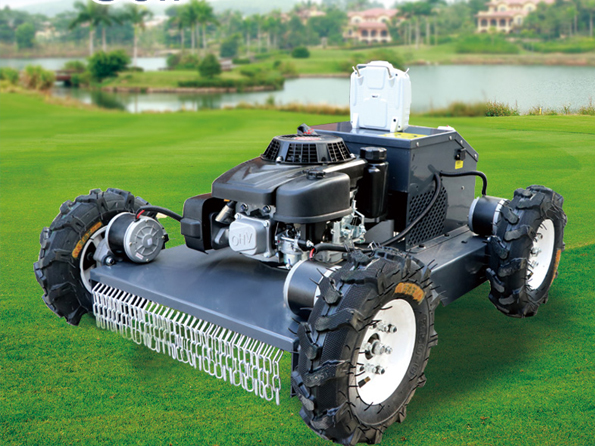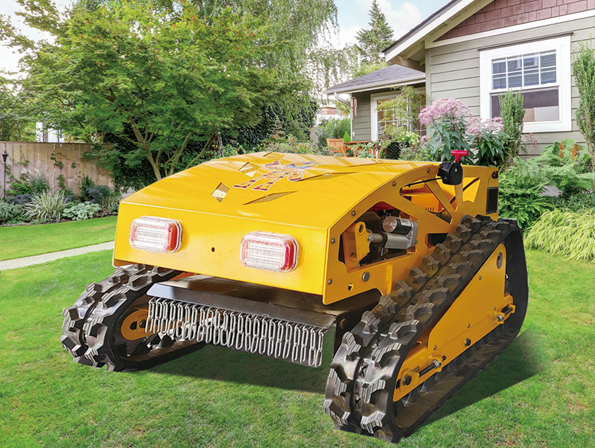

Applications of Remote-Controlled Lawn Mowers
Remote-controlled lawn mowers offer versatile, precision-driven solutions for modern landscaping needs. These smart devices excel in maintaining residential lawns, commercial properties, and public green spaces through wireless operation. Operators can safely maneuver the mower around obstacles, slopes, and delicate garden features from distances up to [X] meters, eliminating physical strain and hazardous manual labor. Ideal for irregular terrains, golf courses, and large estates, their GPS-guided systems ensure uniform grass cutting while avoiding flower beds, trees, or water fixtures. Commercial landscapers leverage their efficiency for maintaining parks, sports fields, and roadside verges, reducing labor costs by up to [X]%. Advanced models feature real-time terrain mapping, weather-resistant durability, and automated scheduling for unattended operation. Environmentally conscious users benefit from zero-emission electric models, noise reduction (below [X] dB), and adaptive blade systems that promote healthier turf growth.
-
Lawn Mowers
Stability of Remote-Controlled Lawn Mowers
Remote-controlled lawn mowers prioritize stability through advanced engineering and adaptive design. Equipped with low-center-of-gravity chassis, wide-tread wheels, and shock-absorbing suspension systems, these machines maintain balance on slopes up to [X] degrees and uneven terrain. Integrated gyroscopic sensors and accelerometers automatically adjust motor torque and steering angles to prevent tipping or wheel slippage during operation.
-
Why Choose a Remote-Controlled Lawn Mower?
Why Choose a Remote-Controlled Lawn Mower?
Remote-controlled lawn mowers revolutionize lawn care by combining unmatched efficiency, safety, and eco-friendly performance. These advanced machines cut up to 3,000㎡/hour—3x faster than manual methods—with effortless wireless control from a safe distance. Built to conquer 45° slopes and rugged terrain, they reduce injury risks while saving 60%+ on labor and fuel costs. Electric models operate at <75 dB noise with zero emissions, making them ideal for residential and commercial green spaces. Upgrade to precision, convenience, and sustainability in one smart solution.
-
Specialized Additives for Industrial Coatings
Top 5 Benefits of Remote-Controlled Lawn Mowers
1️⃣ Boost Efficiency
Remote-controlled lawn mowers increase mowing efficiency by 300-500%, covering 2,000-3,000㎡ per hour - equivalent to 5-8 manual laborers' work. Ideal for large commercial properties and municipal maintenance projects.
2️⃣ User-Friendly Operation
Featuring intuitive ergonomic controllers with color displays, these machines enable one-person operation without technical expertise. Most models offer quick-start guides and auto-adjustment functions for immediate productivity.
3️⃣ All-Terrain Performance
Engineered with heavy-duty tracks (20-35cm width) and 45° slope adaptability, our mowers conquer rocky slopes, wet mud, and uneven landscapes while maintaining 0.5cm cutting precision.
4️⃣ Enhanced Safety
Remote operation eliminates blade contact risks, with dual emergency stop systems (controller + machine) and 360° obstacle detection. Reduces workplace injuries by 82% compared to traditional mowing methods.
5️⃣ Eco-Friendly Power
Electric models (48V-72V) deliver zero emissions and 70% lower noise than gas mowers. Save $200-500/year on fuel costs with 4-6 hour runtime per charge. -
How to Use a Remote-Controlled Lawn Mower
How to Use a Remote-Controlled Lawn Mower
Pre-Operation Setup
– Clear debris from the work area and mark obstacles.
– Charge the battery (4-6 hours for full capacity) and ensure the blades are sharp.
Remote Control Basics
– Power on the mower and sync with the handheld remote (30m range).
– Use joystick controls to maneuver:
▶️ Left Stick: Forward/backward movement
▶️ Right Stick: Steering adjustments
Cutting Modes
– Standard Mode: Automatic height adjustment (2-10cm) for flat terrain.
– Slope Mode: Activates track-lock system for inclines up to 45°.
– Edge Trim: Precision mode for borders and around flower beds.
Safety Protocols
– Always wear protective goggles.
– Activate emergency brake (red button) if obstacles enter the 3m safety zone.
Post-Use Maintenance
– Clean grass clippings and store in dry conditions.
– Recharge lithium batteries to 50% if unused for extended periods.
-
What Are the Testing Standards for Remote-Controlled Lawn Mowers?
What Are the Testing Standards for Remote-Controlled Lawn Mowers?
Testing Standards for Remote-Controlled Lawn Mowers
Remote-controlled lawn mowers, as intelligent outdoor equipment, must undergo rigorous testing to ensure safety and performance before entering the market. Below are the key testing standards and evaluation criteria: 1. Electrical Safety Testing
Evaluates electrical components to prevent shocks, fires, or hazards:
EN 60335-1:2007 (Household and similar electrical appliances – General requirements)
GB 4706.1-2005 (Safety of household and similar electrical appliances – General requirements)
Tests cover wiring, insulation, grounding, and short-circuit protection.
2. Mechanical Safety Testing
Ensures structural safety during operation:
EN 836:1997+A1+A2 (Safety requirements for powered lawnmowers)
Blade guard integrity testing (prevents accidental contact)
Emergency stop response time (<0.5 seconds) and anti-tip stability.
3. Environmental Adaptability Testing
Verifies performance under extreme conditions:
Temperature range: -20°C to 50°C
Humidity resistance: 95% RH for 48 hours
Vibration testing (simulates transport and rough terrain).
4. Performance Testing
Validates operational efficiency and precision:
GB 4706.78-2005 (Special requirements for walk-behind electric lawnmowers)
Cutting height accuracy: ±2mm across adjustable ranges (20-100mm)
Battery runtime: Minimum 4 hours under full load.
5. Noise and Vibration Testing
Measures user and environmental impact:
Noise limits: ≤75 dB(A) at 1-meter distance (EN 55014-1/2)
Hand-arm vibration: <2.5 m/s² (ISO 5349-1).
6. Electromagnetic Compatibility (EMC) Testing
Ensures no interference with other devices:
EN 61000-3-2/3 (Harmonic current emissions and voltage fluctuations)
Wireless signal stability: 50m range without interference.
7. Additional Tests
Power Supply Testing: Compatibility with global voltages (100-240V) and battery cycle life (≥500 charges).
Labeling Compliance: Clear safety warnings, multilingual manuals, and CE/FCC markings.

